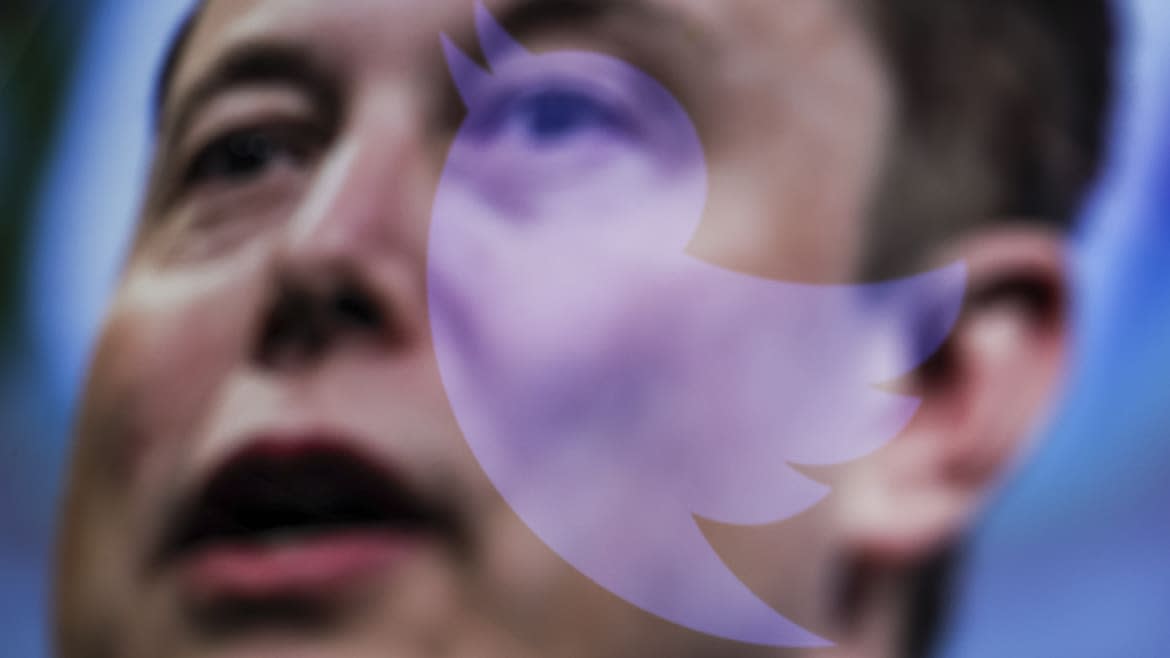Musk Hints at Legal Claim Over Twitter Boycott—and Organizers Yawn

As advertisers flee Twitter, Elon Musk boldly claimed that he could sue the organizers of a boycott against the platform. The activists, however, weren’t fazed—and neither were legal experts, who scoffed at the threat.
Last week, more than 40 public advocacy groups signed onto a letter asking Twitter’s top advertisers to pull ads from the platform unless the new owner pledged to keep toxic and hateful content off the platform. Around the same time, at least nine companies—including big names like Pfizer and General Motors—stopped or suspended advertising with the company.
Musk complained that Twitter experienced a “massive drop in revenue, due to activist groups pressuring advertisers,” adding, with no apparent recognition of the irony: “They’re trying to destroy free speech in America.”
On Monday, he took it even further, responding to a tweet about whether Twitter had a “tortious interference” claim against the boycott activists by saying, “We do.”
Nora Benavidez, senior counsel at Free Press, an advocacy group that has helped organize the pressure campaign on advertisers, isn’t concerned, saying the billionaire’s tweet had demonstrated “his complete misunderstanding of what free speech principles are, and that boycotts themselves are protected speech.”
She added, “I guess I just don't really comprehend how he couldn't surround himself with constitutional law experts.”
Elon Musk Tries to Win Advertisers Back by Threatening Them
Benavidez said she hopes Twitter’s advertisers will leverage their wallets and “demand better from a company that was already failing before Musk, and has only gotten more toxic since Musk took over.”
Angelo Carusone, CEO of the left-leaning media watchdog Media Matters, which has also worked on the lobbying effort, said he is also not losing sleep over the volatile mogul’s next move. “You can't ever stop someone from suing you for ridiculous things,” he said,” but “there is no anxiety” about a potential lawsuit from Musk.
Experts in torts law told The Daily Beast the activists have little to worry about. Keith Hylton, a professor at Boston University School of Law, said tortious interference is usually invoked when a third party meddles with someone else’s business relationships—say, driving away their customers—purely in the interest of causing them harm. “It’s not as if that person is trying to persuade the customer to do business with them instead,” Hylton explained. “They’re just trying to destroy your relationship and that’s it.”
On the face of it, then, Musk could be seen to have a claim against the activists. But, Hylton said, it would be difficult for the billionaire to prove that the activists alone caused advertisers to flee, rather than the companies deciding to do so on their own. (General Motors, for example, paused their advertising on Oct. 28—days before the groups sent out a letter to advertisers.)
In addition, tortious interference usually requires some element of threat or force. Simply asking advertisers to pull their ads is not illegal, Hylton said, nor is explaining the reasons why they should be pulled.
“If you have a civil rights group that’s sending out letters because they think they have a concern with hate speech — well, that's what they always do, that’s what their business is,” Hylton said. “It would be a strange thing to do to find them liable for engaging in the speech they always engage in.”
The activists’ letter, he said, was simply “an appeal” from the group to advertisers—not a threat. Even if there were some inaccuracies in the letter, he added, they likely would not reach the level of lies, which can be used as an argument for tortious interference.
“When it comes to this letter, I don’t see the case,” he said.
Anthony Casey, a professor at the University of Chicago Law School, added that a successful tortious interference lawsuit typically requires proving “pretty extreme” conduct by the defendants, which doesn’t appear to be the case here.
“It’s a weak claim,” he said,
Neither Musk nor Twitter immediately responded to a request for comment.
Carusone said that Musk’s aggression had scared some major advertisers out of issuing public statements, since companies “know that the first one out of the gate to give a big broadside statement is going to get just slammed by him.” Privately, though, multiple firms have pulled back spending.
Musk’s recent partisan tweets have further complicated the situation. On Monday, he urged his 115 million followers to vote Republican in the upcoming midterm elections, in order to curb the power of the Democrat-held White House—thereby mitigating what he described as the “worst excesses of both parties.” According to Carusone, advertisers worry that publicly critiquing Musk could be depicted as retaliation for his endorsement of Republican causes.
For the moment, Carusone predicted, many companies will continue to slow or halt spending—although Musk’s unpredictability requires advertisers to be nimble.
“He could also tweet another crazy conspiracy, and they'll be forced to say something.”
Get the Daily Beast's biggest scoops and scandals delivered right to your inbox. Sign up now.
Stay informed and gain unlimited access to the Daily Beast's unmatched reporting. Subscribe now.

 Yahoo News
Yahoo News 
